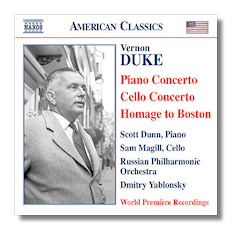
The Internet's Premier Classical Music Source
Related Links
- Latest Reviews
- More Reviews
-
By Composer
-
Collections
DVD & Blu-ray
Books
Concert Reviews
Articles/Interviews
Software
Audio
Search Amazon
Recommended Links
Site News
 CD Review
CD Review
Vernon Duke

Concertos
- Piano Concerto (orch. Scott Dunn)
- Cello Concerto
- Homage to Boston (Suite for Solo Piano)
Scott Dunn, piano
Sam Magill, cello
Russian Philharmonic Orchestra/Dmitry Yablonsky
Naxos 8.559286 57:30
I can just picture the scene: Prokofieff on a shopping spree with a friend in Macy's in 1938, buying a laundry-list of things to take back to Russia. The friend? Vladimir Dukelsky, known in the United States, and professionally, as Vernon Duke. Russian-émigré Duke was a friend and admirer of Prokofieff, and Prokofieff's influence is evident in Duke's serious music. The Piano and Cello Concertos here are among the best examples of that influence.
Duke, who became better known for his Broadway shows (Cabin in the Sky, Walk a Little Faster, Thumbs Up, etc.) and the numerous hits from them (Autumn in New York, April in Paris, Taking a Chance on Love, etc.), led a parallel career as a composer of concertos, ballets, symphonies and other classical works. Prokofieff promoted Duke's serious music in Russia and it's not hard to see why.
Overall, one can say that Duke was a composer with the ability to create memorable tunes and employ them with interesting harmonies and catchy rhythms. He may not quite have had Prokofieff's gift for melody, but certainly he was ahead of Shostakovich and Stravinsky, in this respect. One can only wonder how well Duke would have fared, had he devoted his entire career to serious music.
Because of other important projects, the 1923 Piano Concerto was never orchestrated by the composer, despite the promise of a première by Arthur Rubinstein, for whom it was written. Scott Dunn, the soloist here, completed the orchestration and premièred the work in 1999. The concerto opens with a mocking, playful, rather Prokofieffian theme, and there soon follows a lovely second theme that George Gershwin, also a Duke acquaintance, found utterly enchanting in private performances given by the composer. Other attractive material is presented and the themes are developed imaginatively over the course of this one-movement, 18-minute work. In the end, the piece comes across as light and quite engaging, a work that deserves more than rediscovery and a single recording. One might hope for an occasional performance in a major venue and a few more recordings. Dunn's performance and the Dmitry Yablonsky-led Russian Philharmonic Orchestra sound absolutely convincing in this première Naxos CD.
The Cello Concerto (1945) is similarly light, but perhaps a bit more substantial too. It is even more colorfully scored, which is not to suggest that Dunn's orchestration for the piano concerto is somehow inferior. No, it's just that Duke apparently wanted to produce a score for cello that was not subdued or somber or mellow, like more than a few concertos for this instrument. In the first movement, passages dominated by the soloist often alternate with contrasting, i.e., busy or heavily-scored, passages where the orchestra holds sway (the movement opens and closes with a cadenza for the soloist), but in the infectious, Shostakovich-tinged finale the cello and orchestra are somewhat better integrated. The second movement gives a nod or two in the opening moments to Stravinsky in some of the wind scoring, but the haunting main theme is of Duke's own imaginative devising. Cellist Sam Magill turns in fine work here and is nicely abetted by Yablonsky and company.
The piano work Homage to Boston (Suite for Piano Solo) was published in 1945. Comprised of seven movements and lasting over twelve minutes, it depicts people and sites associated with Boston. One of those depicted is Prokofieff (he appeared in Boston several times to perform with the Serge Koussevitzky-led Boston Symphony Orchestra). Prokofieff is given a gavotte, one that sounds vaguely similar to the famous gavotte in the Classical Symphony. The closing piece, Midnight Train, actually sounds more like Prokofieff than anything else in the music. Homage to Boston is an engaging work, with an often bluesy character. Again, Scott Dunn performs the work with utter commitment and a complete sense for Duke's colorful style.
In the end, one can only conclude that this disc was highly enjoyable and featured excellent sound and performances throughout. If you want to try something different and new, something accessible with engaging tunes, this disc may just be the ticket.
Copyright © 2008, Robert Cummings




















